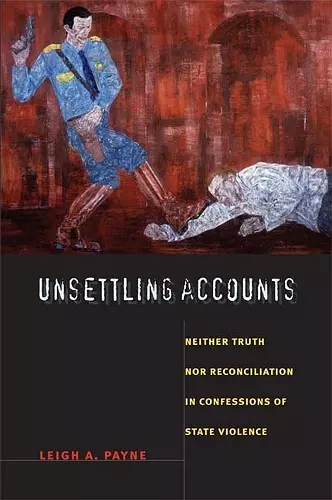Unsettling Accounts
Neither Truth nor Reconciliation in Confessions of State Violence
Format:Paperback
Publisher:Duke University Press
Published:11th Jan '08
Currently unavailable, and unfortunately no date known when it will be back

Focuses on perpetrators of human rights crimes, investigating confessions by human rights violators in contexts of transitional justice in South America and South Africa
Asks what happens when perpetrators publicly admit or discuss their actions. This book contends that public confessions do not settle the past. It argues that this debate and the public confessions that trigger it are healthy for democratic processes of political participation, freedom of expression, and contestation of political ideas.An Argentine naval officer remorsefully admits that he killed thirty people during Argentina’s Dirty War. A member of General Augusto Pinochet’s intelligence service reveals on a television show that he took sadistic pleasure in the sexual torture of women in clandestine prisons. A Brazilian military officer draws on his own experiences to write a novel describing the military’s involvement in a massacre during the 1970s. The head of a police death squad refuses to become the scapegoat for apartheid-era violence in South Africa; he begins to name names and provide details of past atrocities to the Truth Commission. Focusing on these and other confessions to acts of authoritarian state violence, Leigh A. Payne asks what happens when perpetrators publicly admit or discuss their actions. While mechanisms such as South Africa’s Truth and Reconciliation Commission are touted as means of settling accounts with the past, Payne contends that public confessions do not settle the past. They are unsettling by nature. Rather than reconcile past violence, they catalyze contentious debate. She argues that this debate—and the public confessions that trigger it—are healthy for democratic processes of political participation, freedom of expression, and the contestation of political ideas.
Payne draws on interviews, unedited television film, newspaper archives, and books written by perpetrators to analyze confessions of state violence in Argentina, Chile, Brazil, and South Africa. Each of these four countries addressed its past through a different institutional form—from blanket amnesty, to conditional amnesty based on confessions, to judicial trials. Payne considers perpetrators’ confessions as performance, examining what they say and what they communicate nonverbally; the timing, setting, and reception of their confessions; and the different ways that they portray their pasts, whether in terms of remorse, heroism, denial, or sadism, or through lies or betrayal.
“Unsettling Accounts is an extremely valuable contribution to social science scholarship. Leigh A. Payne’s complex and nuanced analysis of when, why, and how perpetrators confess is far more sophisticated than any other research that I know about.”—Lesley Gill, author of The School of the Americas: Military Training and Political Violence in the Americas
“Unsettling Accounts is unique in transitional justice literature in its extended focus on individual perpetrators and on confessions. Leigh A. Payne links individual stories to some of the most pressing questions in transitional justice scholarship.”—Kathryn Sikkink, author of Mixed Signals: U.S. Human Rights Policy and Latin America
“This text is productive and can be used in a range of comparative politics, international relations, performance studies, and transitional justice courses of all levels. It contributes valuable methodological insights that are conducive to renovating academia, activist, and policy communities’ theoretical engagements with violence. Payne’s text encourages the reader to consider deeper theorizations of violence and survival within the frameworks of the state.” -- Heather M. Turcotte * International Studies Review *
“Beyond its potential for underscoring the polemics involved in national reconciliation after state violence, this is a profound work because of its comparative, multidimensional, detailed, and nuanced analysis of what permeates post-conflict societies. Those who will benefit most from this volume are students of peace and conflict studies, practitioners, and general readers. The book is both thought-provoking and engaging in terms of its details and very useful framework.” -- Earl Conteh-Morgan * American Historical Review *
“Payne provides a rich and original perspective on these historical processes in Argentina, Chile, Brazil and South Africa through a detailed analysis of the confessions of individuals responsible for past state violence.” -- Alexander Wilde * A Contracorriente *
“This book makes a significant contribution to the fields of transitional justice and democratization by examining what happens when the institutional silence and denial of past crimes is broken by individuals. Payne’s important point here is that, whatever the motivations of the perpetrator who confesses, the stories open up debate and help challenge the political consensus of supporters of the past repressive regime.” -- Michael Humphrey * American Journal of Sociology *
ISBN: 9780822340829
Dimensions: unknown
Weight: 535g
392 pages